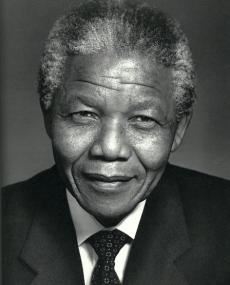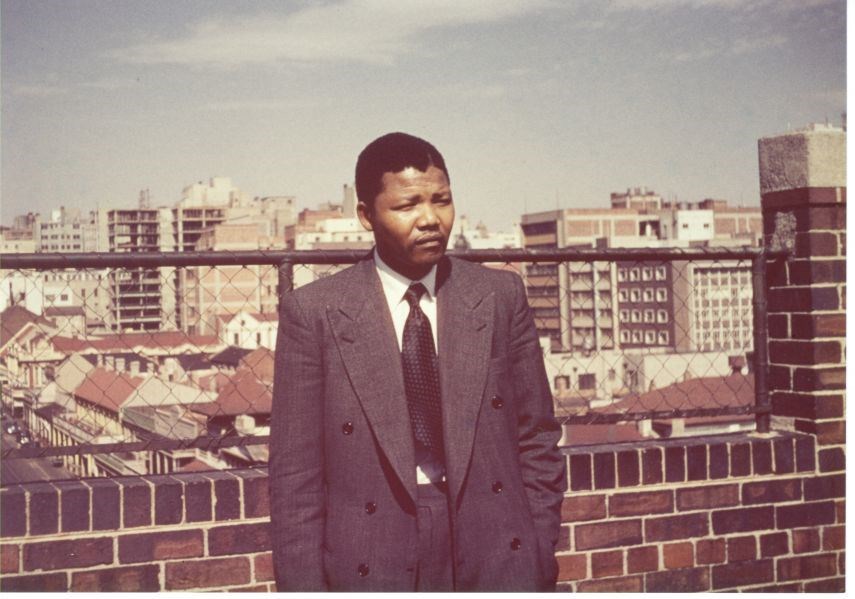The greatest glory in living lies not in never falling, but in rising every time we fall.
A political prisoner responsible and convicted of sabotage, recruiting followers to his side and going against a government is a hero. Nelson Mandela was born on July 18, 1918, in Mvezo, South Africa. He is best known for ending the South African apartheid and becoming the president of South Africa. He is my hero because he fought for equality, he fought for equality without the use of violence against others, and he never backed down from what he believed in.
 "Nelson Rolihlahla Mandela"sahistoryNelson Mandela was a great and noble man who fought for the glorious goal of equality. In 1944 he joined the African National Congress and started to critique the ANC because he disliked its policy of appeasement. He then became an important part in the formation of the African National Congress Youth League. In 1950, with the help of Tambo, the Communist Party General Secretary, and Walter Sisulu, He created the Congress Alliance. In 1952 the Congress Alliance protested several Apartheid laws and started the Defiance Campaign. During the Defiance Campaign, Mandela became a well-known leader who traveled around South Africa to find people who would protest apartheid laws. He not only attended the All-In Africa Conference in 1961, but “the conference appointed him honorary secretary of the All-In African National Action Council, whose task was to organize a three day stay-at-home on 29, 30 and 31 May 1961 to coincide with the proclamation of South Africa as a Republic on 31 May. This was the last public meeting he addressed for the next 29 years. On 3 April 1961 Mandela issued a statement on behalf of the All-in African National Action Council calling on students and scholars to support the stay-at-home campaign.” (sahistory). These instances show that Mandela was fighting inequality and unjust laws for almost twenty years until his famous speech in court. He not only observed problems in his society, but he actually did something about them. In October 1963, Mandela stated to the court “ I have fought against white domination, and I have fought against black domination. I have cherished the ideal of a democratic and free society in which all persons live together in harmony and with equal opportunities. It is an ideal which I hope to live for and to achieve. But if needs be, it is an ideal for which I am prepared to die.” This showed the people how committed Mandela was to achieving equality; it shows the people of today how important equality is. His message tells the world that the fight for equality and fair treatment of others is something worth dying for and should be sought, no matter the possible consequences. In 1989 Mandela negotiated with the government for the ANC, because the government knew apartheid was about to end. Mandela had stayed true to his goal for a better South Africa by not backing down or taking the easy way out because he knew that equality was not a topic that should have compromise.“Throughout his imprisonment he had rejected at least three conditional offers of release.” (Nelson Mandela Foundation)
"Nelson Rolihlahla Mandela"sahistoryNelson Mandela was a great and noble man who fought for the glorious goal of equality. In 1944 he joined the African National Congress and started to critique the ANC because he disliked its policy of appeasement. He then became an important part in the formation of the African National Congress Youth League. In 1950, with the help of Tambo, the Communist Party General Secretary, and Walter Sisulu, He created the Congress Alliance. In 1952 the Congress Alliance protested several Apartheid laws and started the Defiance Campaign. During the Defiance Campaign, Mandela became a well-known leader who traveled around South Africa to find people who would protest apartheid laws. He not only attended the All-In Africa Conference in 1961, but “the conference appointed him honorary secretary of the All-In African National Action Council, whose task was to organize a three day stay-at-home on 29, 30 and 31 May 1961 to coincide with the proclamation of South Africa as a Republic on 31 May. This was the last public meeting he addressed for the next 29 years. On 3 April 1961 Mandela issued a statement on behalf of the All-in African National Action Council calling on students and scholars to support the stay-at-home campaign.” (sahistory). These instances show that Mandela was fighting inequality and unjust laws for almost twenty years until his famous speech in court. He not only observed problems in his society, but he actually did something about them. In October 1963, Mandela stated to the court “ I have fought against white domination, and I have fought against black domination. I have cherished the ideal of a democratic and free society in which all persons live together in harmony and with equal opportunities. It is an ideal which I hope to live for and to achieve. But if needs be, it is an ideal for which I am prepared to die.” This showed the people how committed Mandela was to achieving equality; it shows the people of today how important equality is. His message tells the world that the fight for equality and fair treatment of others is something worth dying for and should be sought, no matter the possible consequences. In 1989 Mandela negotiated with the government for the ANC, because the government knew apartheid was about to end. Mandela had stayed true to his goal for a better South Africa by not backing down or taking the easy way out because he knew that equality was not a topic that should have compromise.“Throughout his imprisonment he had rejected at least three conditional offers of release.” (Nelson Mandela Foundation)
 Nelson Mandela in 1952nelsonmandela.orgEven though his main goal was equality and a better South Africa, Mandela wanted to achieve his goals peacefully. After Mandela was acquitted in the treason trial and the police crackdown on protesters, he helped form the Umkhonto we Sizwe, also known as “The Spear of the Nation” and the MK. He was the first commander and chief of MK and with their help, they resisted with sabotage. Even though it was referred to as violence, it was only “violent” towards the property. It did not target people. When speaking to the Judge when he was tried under the Suppression of Communism Act, he said, “Four forms of violence were possible. There is sabotage, there is guerrilla warfare, there is terrorism, and there is open revolution. We chose to adopt the first. Sabotage did not involve loss of life, and it offered the best hope for future race relations. Bitterness would be kept to a minimum and, if the policy bore fruit, democratic government could become a reality.” Mandela knew violence towards the people of South Africa would make them less ready to come together, and that they could act out in protest without harming others. When he was president he repeatedly called for peace and discipline from his followers after the leader of the South African Communist Party (SACP), Chris Hani, was assassinated. The South African Communist Party was a group that had been friends with Mandela. In the trial where Mandela was tried under the Suppression of Communism Act he says, “What is more, for many decades communists were the only political group in South Africa prepared to treat Africans as human beings and their equals; who were prepared to eat with us; talk with us, live with us, and work with us. They were the only group which was prepared to work with the Africans for the attainment of political rights and a stake in society. Because of this, there are many Africans who, today, tend to equate freedom with communism.” This shows that for decades that party has been allied with Mandela. Mandela could have said nothing and let his followers lash out at the people that did the wrong, but he went out of his way to ask for peace. He knew that the nation needed to be brought together and that violence was not the answer to this problem.
Nelson Mandela in 1952nelsonmandela.orgEven though his main goal was equality and a better South Africa, Mandela wanted to achieve his goals peacefully. After Mandela was acquitted in the treason trial and the police crackdown on protesters, he helped form the Umkhonto we Sizwe, also known as “The Spear of the Nation” and the MK. He was the first commander and chief of MK and with their help, they resisted with sabotage. Even though it was referred to as violence, it was only “violent” towards the property. It did not target people. When speaking to the Judge when he was tried under the Suppression of Communism Act, he said, “Four forms of violence were possible. There is sabotage, there is guerrilla warfare, there is terrorism, and there is open revolution. We chose to adopt the first. Sabotage did not involve loss of life, and it offered the best hope for future race relations. Bitterness would be kept to a minimum and, if the policy bore fruit, democratic government could become a reality.” Mandela knew violence towards the people of South Africa would make them less ready to come together, and that they could act out in protest without harming others. When he was president he repeatedly called for peace and discipline from his followers after the leader of the South African Communist Party (SACP), Chris Hani, was assassinated. The South African Communist Party was a group that had been friends with Mandela. In the trial where Mandela was tried under the Suppression of Communism Act he says, “What is more, for many decades communists were the only political group in South Africa prepared to treat Africans as human beings and their equals; who were prepared to eat with us; talk with us, live with us, and work with us. They were the only group which was prepared to work with the Africans for the attainment of political rights and a stake in society. Because of this, there are many Africans who, today, tend to equate freedom with communism.” This shows that for decades that party has been allied with Mandela. Mandela could have said nothing and let his followers lash out at the people that did the wrong, but he went out of his way to ask for peace. He knew that the nation needed to be brought together and that violence was not the answer to this problem.
Not only were Mandela’s traits needed in his time, but his heroic traits are needed in today’s world as well. His view on equality should be replicated by everyone. For example, Mandela’s views on equality would help in places like Saudi Arabia, where they are trying to expand the rights of women. His ideology of equality would also help the Rohingyas in Myanmar. The Rohingyas are not even viewed as citizens and are faced with discrimination and violence because they are a Muslim minority in a Buddhist area. Mandela’s attribute of actually seeing problems and acting to fix them is an attribute greatly needed in present-day society. We need the spirit of Mandela when the FCC tries to get rid of Net Neutrality, or when another Mass Shooting happens. We, the people, need the ability to actually do something, and not just complain about Ajit Pai, or tweet “Thoughts and Prayers”. Society has to have the courage and will to do what's right, even if it may not be easy.
“Biography of Nelson Mandela.” Nelson Mandela Foundation, Nelson Mandela Foundation, 2017. Web. 29 Nov 2017. < www.nelsonmandela.org/content/page/biography>
"Nelson Mandela - Biographical". Nobelprize.org. Nobel Media AB 2014. Web. 29 Nov 2017. <https://www.nobelprize.org/nobel_prizes/peace/laureates/1993/mandela-bio.html>
“Nelson Rolihlahla Mandela.” South African History online, South African History Online, 28 July 2011. Web. 29 Nov 2017. < www.sahistory.org.za/people/nelson-rolihlahla-mandela>
Page created on 1/3/2018 7:04:26 PM
Last edited 1/8/2018 1:15:25 PM
